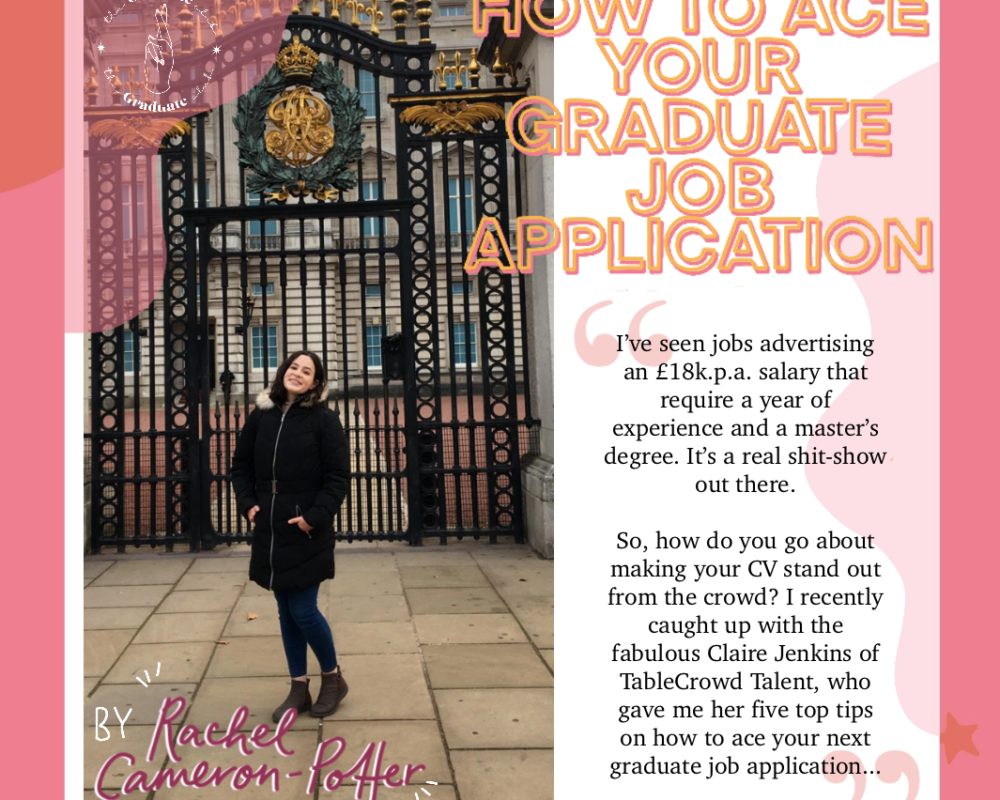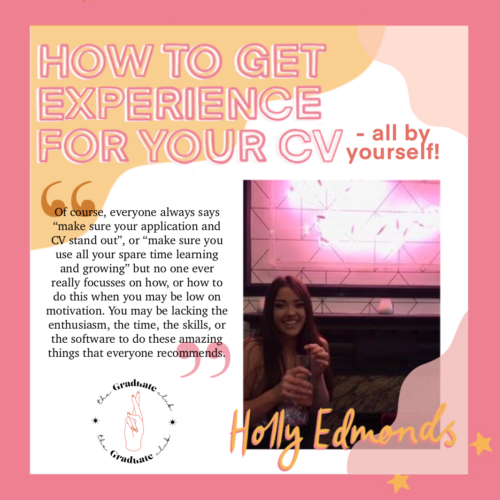2020 graduates have had it rough. Really, really rough. Imagine having spent three years working your ass off only to have a shockingly mediocre graduation ceremony over Zoom before being catapulted into a collapsing economy where employers know too damn well that they have the upper hand. I’ve seen jobs advertising an £18k.p.a. salary that require a year of experience and a master’s degree. It’s a real shit-show out there.
So, how do you go about making your CV stand out from the crowd? I recently caught up with the fabulous Claire Jenkins of TableCrowd Talent, who gave me her five top tips on how to ace your next graduate job application:
- Write a good CV
Seemingly obvious, but it begs the question: what exactly makes up a good CV? Graduate CVs really shouldn’t be more than 1-2 pages long, so being concise is key, aiming for no more than 3-5 bullet points for each level of experience. Think about what the role entails and how your previous experiences match up to what the job requires; even by doing a degree you would have gained skills in problem solving, teamwork and time management.
Something Claire believes is imperative to a good CV is the profile. Too often hiring managers will see CVs lacking these few crucial lines, meaning they know nothing about the candidate, who they are, or what they want to do. Consequently, these hiring managers, who must sift through possibly hundreds of applications for one job opening, resort to discarding these CVs in favour of those that have a profile.
To write a great profile, Claire believes there are four important questions to answer:
- What are you? (e.g. 1st class English Literature graduate from the University of York)
- What have you been doing? (e.g. experienced in customer service as a bartender and treasurer of the Printing Society)
- Who are you? (e.g. Passionate about writing blogs, planning events and motivating others)
- What do you want to do next? (e.g. Looking to kickstart my career in PR)
(PS. TableCrowd will be releasing a blog later this week on how to write a great profile, so keep your eyes peeled.)
- Do online learning
Your university days may be over (sob), but it doesn’t mean you have to stop learning. In fact, if you really want to make your CV stand out (see above), it’s always good to have a line on there that showcases your passion for your sector of interest outside of the university bubble. Sites like FutureLearn have plenty of great (and free!) courses to keep you learning something new every day.
- Have a good LinkedIn profile
If you haven’t already, now is the time to invest in setting up a good LinkedIn profile. It’s a great way to connect with employers and recruiters, and to see what the businesses that you’re interested in are up to. More importantly, it’s also a chance for you to show off just how brilliant you are to the very same employers, recruiters and businesses that you’re trying to get in with.
Start with the basics, such as filling out your job and academic history and having a strong personal statement to give an overview of who you are and what you’re interested in. Then, start to go into more detail: list any software that you’ve got a good understanding of (that includes social media and Microsoft Office!) and ask a previous employer to write a recommendation for you. As per the point above, LinkedIn also lets you complete free online assessments that you can show off on your profile!
- Know the industry
It might not be your dream industry, but if you want to be in with a shot of landing the job, you need to at least have a basic understanding of what the industry does. The context of the business informs everything you need to know about them, from their business model and competitors, right the way down to the day-to-day tasks of your job.
Here, Google is your best friend. Make sure you research the company to understand their background as best as you can, and then go on to Google the industry to gain a deeper understanding of competitors and their activity.
- If you get a job interview, prep hard
After sifting through hundreds of applications, the hiring managers have picked out your CV and called you to interview. Congratulations! Now it’s time to get your head down and start preparing.
First things first, make sure you know your CV inside and out, back to front. As an icebreaker, it’s likely they’ll go through the CV first, asking you about your degree and experience, so it’s crucial that you don’t draw a blank here. These are the “softer” questions, so if you can’t give a good answer here, it’s game over.
Next, be sure to know the job role. Know your responsibilities, know how your previous experience will help you conduct your day-to-day tasks and know how you’ll work to overcome any challenges the new job might pose.
Pay attention to the finer details. Research the interviewer on LinkedIn to know exactly who you will be meeting with, so you know exactly what your relationship to them will be. Will you be reporting to them? Will they be a team member? Or are they the CEO?
Finally, have a good set of questions lined up. Even if you’ve aced the interview, if you have absolutely no questions to ask at the end, odds are you’ll have blown it. Try to make them as specific to the job as possible. You want to make yourself memorable, so ask questions that really show you’ve done your homework and you want to know more.
For more top tips from Claire, check out her blog ‘Top Things To Do During COVID-19 To Increase Your Chances of Getting Hired,’ and be sure to visit her at TableCrowd Talent for more. Happy job hunting!





Leave a Comment